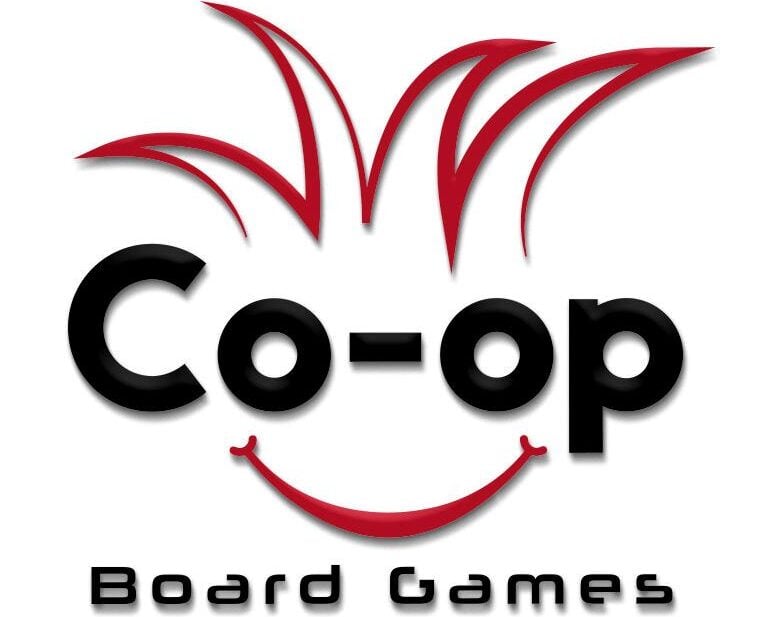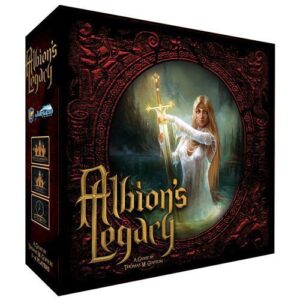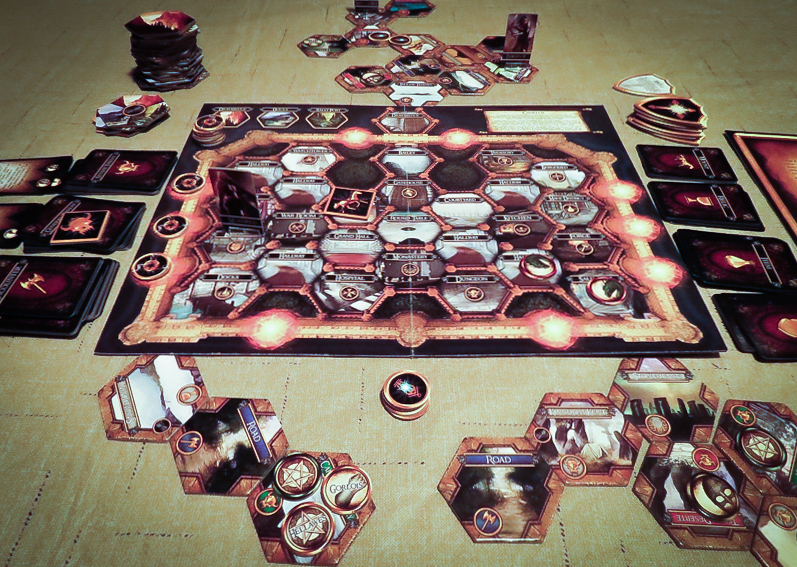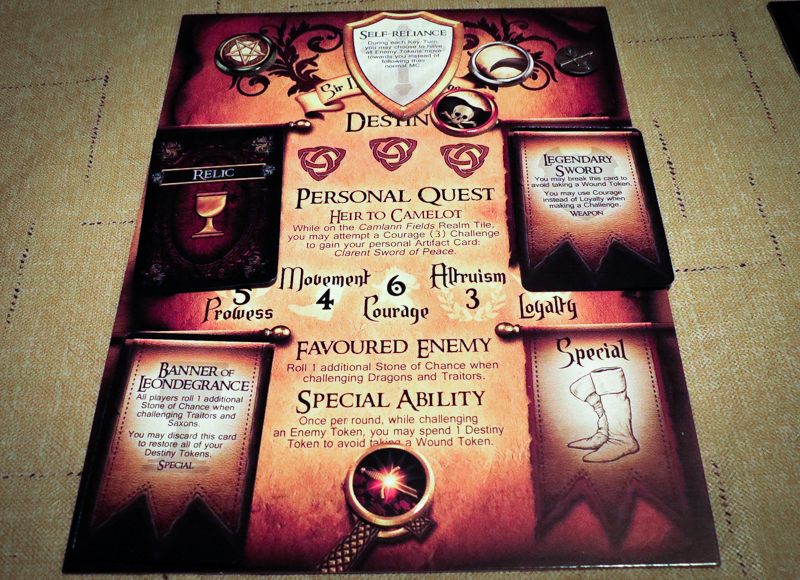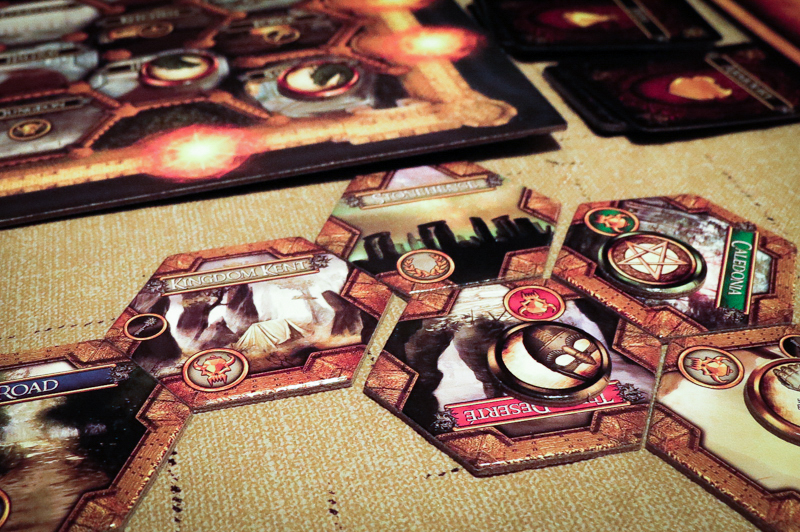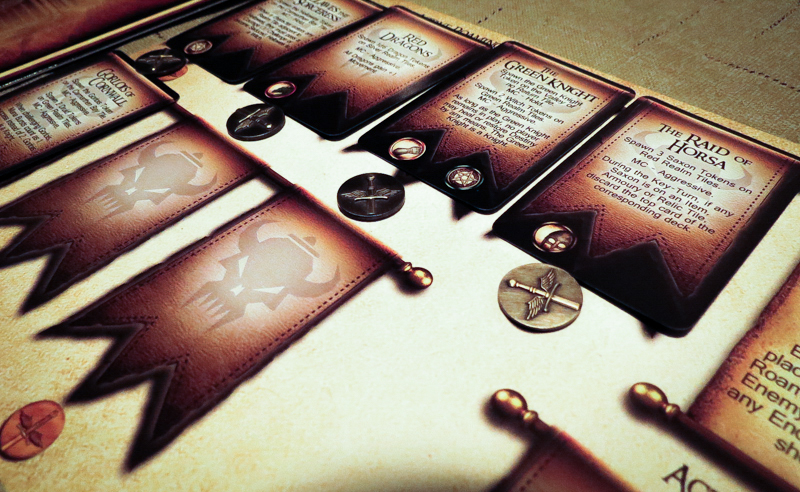Albion’s Legacy Review
Year: 2015 | Players: 1-4 | Minutes: 90 | Ages: 14+
This Albion’s Legacy review is based on four plays, including a two-player game, a three-player game, and two four-player games.
What is Albion’s Legacy?
Albion’s Legacy is a cooperative Arthurian adventure game designed by Thomas M. Gofton, Aron Murch, and Cameron Parkinson, and published by Lynnvander Productions and Jasco Games.
In this game, you and up to three other people play as these classic characters (King Arthur, Merlin, Lancelot, etc.) and are attempting to complete quests in and around Camelot.
Albion’s Legacy Gameplay
This is going to be a very simplified overview of Albion’s Legacy. If you want to see all of the rules, check out the official rulebook at BGG.
At the beginning of the game, you’ll set up the board and choose one of the three Story Quests. You’ll then choose King Arthur and/or his allies to be your characters, each of which has their own set of attributes and special abilities.
Each round one player will be given the Key-Turn token, which means they will be taking two turns during that round. After the first player has taken their second turn, the Key-Turn takes place, activating the enemies that are currently on the board.
Throughout the game you’re going to be moving, scouting (flipping new tiles/expanding the board), challenging enemies, attempting other challenges, using items, and activating tiles you’re on. What you’re trying to do is build up your character as you attempt to complete the Story Quest’s objectives and collect Quest Coins.
You can add different Inventory Cards and Virtue Plaques to your character sheet throughout the game by visiting specific tiles. The cards, which give you temporary or permanent buffs, are weapons, armor, relics, and mounts. The Virtue Plaques give you new unique abilities.
You’ll be drawing Threat Cards every time you flip a new tile that has that icon on it. This happens a lot. These can be Roaming Threat Cards or Severe Threat Cards. The Roaming Threat Cards spawn the weaker ‘Non-Named’ enemies, while the Severe Threat Cards bring in the ‘Named’ enemies along with one or two Non-Named enemies. If you’re able to defeat all of the enemies listed on a Threat Card, you will get a Quest Coin.
When you challenge enemies or try to complete other types of challenges, you’re going to be rolling dice based on your attribute level for a particular skill. For example, if an enemy requires you to use your Prowess skill, you will check the number under that attribute on your character sheet and roll that many dice. You’ll then have to meet or exceed the number of successes shown for that challenge.
Everyone is working together in this game, but each character also has his or her own Personal Quest. These quests tell you which tile your character needs to get to during the game to find their own unique artifact.
If you’re able to complete the Story Quest’s objectives and get enough Quest Coins, everyone wins. You’ll lose the game if you run out of Virtue Plaques or if you run out of time before completing all of your objectives.
Check out Albion’s Legacy at Amazon
Pros and Cons
Pros
- First off, we always give designers credit when it’s obvious a lot of hard work went into making a game. That is certainly the case with Albion’s Legacy. I don’t even know most of these stories, but I was definitely pulled into this world thanks to the text on every character’s sheet and the way the designers stayed true to the theme with the encounters, threats, and quests. Really cool.
- The open world feel to Albion’s Legacy is what makes it really stand out for us. Other than fighting enemies that are in your area, the game never forces you to do anything. You can travel pretty much anywhere and search for the items you’ll need to (hopefully) succeed.
- Each character feels very different than all of the others. They’re also powerful in very different ways, meaning you’ll have to work cooperatively to figure out who should be doing what to give the team the best chance.
- The Personal Quests add that extra something special to the game. Even though you don’t have to complete those quests, it’s pretty awesome when you get an item that only that specific character can use.
- Scouting is exciting, which is great because there is a lot of scouting. You never know if you’re going to find a powerful enemy, a location the team was looking for to complete part of the Story Quest, or a location that you need to go on your Personal Quest.
- Oh, and the game looks pretty fantastic on the table, especially once you have 10+ tiles laid out.
Cons
- It can be tough to track movement in this game. You might have to do multiple challenges on your turn and it’s easy to forget how many moves you’ve made. This is especially true if you have to control more than one character.
- You’re going to be rolling a lot of dice and checking a lot of skill modifiers throughout the game. Sometimes you’ll have a card in play that allows you to switch attributes to other attributes, and you might even have another card that gives you an extra die for that attribute you’re switching to. Most people in my group don’t mind a lot of dice chuckin’, but it can be headache-inducing when you’re constantly rolling-and-checking, checking-and-rolling, rolling-and-checking.
- Albion’s Legacy is playable solo or as a two-player cooperative game, but it’s definitely better with three or four players. When playing solo or with two players, you have to play with multiple characters and it can be tough keeping track of everything.
- That crease down the middle of the board drives me nuts! It probably won’t bother most people, though.
Final Thoughts
If you’re into Arthurian lore, you’re probably going to want to give Albion’s Legacy a shot. It’s possibly the best Arthurian board game on the market as far as bringing those stories to the forefront goes. Even if you don’t know the stories (like me!), you’ll want to at least think about getting this game if you like thematic, adventure board games and don’t mind a lot of dice chuckin’.
Gamers who are not fans of dice rolling games should probably avoid this one. You’ll probably also want to avoid it if you don’t like RPGs because it kind of has that feel to it, too.
Considering Albion’s Legacy was the first game designed by the Lynnvander team, I’m really impressed with this one. Sure, it has its issues, but most of the people I’ve played it with have had a blast working towards those team and personal quests. It doesn’t necessarily bring anything new to the table mechanically, but the whole package makes for a unique experience.
I personally can’t wait to play the other games in this series (reviews coming soon) because I’m assuming they’ll be as enjoyable as this one and I’m a bit more into those themes (Robin Hood and Peter Pan).
Albion’s Legacy Links
BGG | Amazon | eBay
Thanks for taking the time to read our Albion’s Legacy review!
To stay updated on all things cooperative board games, follow us on Twitter, Facebook, or via RSS.
